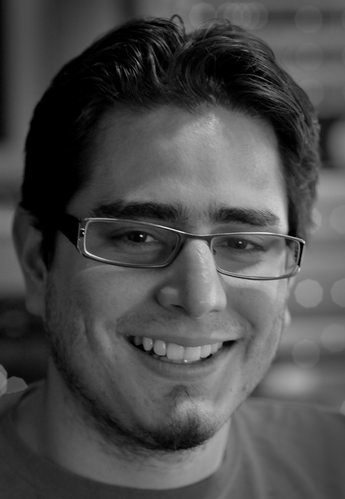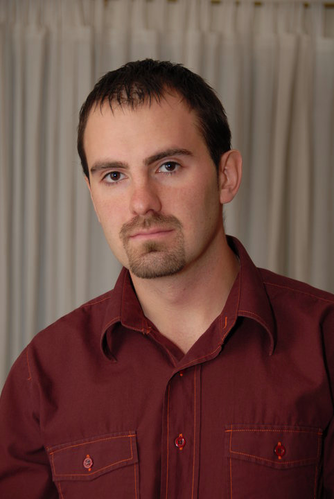Music and Sound for Visual Media Networking Event, November 5

Berklee film scoring major Cesar Suarez

Boston University film major Atanas Bakalov

Berklee electronic production and design major Matteo Stronati
This Saturday, November 5, Berklee's Media Center and its environs will be transformed from their normally tranquil study environments into a buzzing, vibrant networking center, in which Berklee students meet and mingle with local film, television, and video game industry professionals and students. True to its mission of forging collaborations, the organization of the event is itself a collaborative venture of the the Film Scoring Department, the Electronic Production and Design Department, the Learning Center, and two student clubs—the Film Scoring Network and the Video Game Music Club—with support from Academic Affairs and Physical Plant.
In its sixth year, this event has expanded from its original title of Music for Film to include sound design and all forms of visual media, and will include impressive speakers such as Paul Hirsch (Oscar-winning editor of Star Wars, among other notable credits, appearing via Skype), Diego Stocco (sound designer for many films, TV series, and video games, notably Assassin's Creed: Brotherhood and Sherlock Holmes, also via Skype), Shawn Robertson and Jeff Seamster (art and audio leads at Irrational Games, makers of Bioshock, attending in person), and a showcase of seven finalist scores for a short film by a NYU Tisch School of the Arts Asia MFA film student. Last but not least, there will be a panel discussion with a team—including Boston University master's degree film student Atanas Bakalov, Berklee film scoring major Cesar Suarez, and Berklee electronic production and design major Matteo Stronati—who came together at last year's event and went on to work together on Atanas' short film Lover's Leap. We caught up with these three collaborators earlier this month to get a sense for what can come out of an event like Saturday's.
What were your expectations for the event?
Atanas: I heard about the Berklee networking event on a flyer posted on a wall at B.U., and I really didn't have any preconceived notions about what it would be like, but I was interested in meeting composers and finding somebody to collaborate with on the score for my movies.
Cesar: Well, coming from the film scoring major, my expectations were to meet people in the industry, directors, producers—just a way that I could get my foot in the door. I expected just to understand the industry that I'm getting into, understand and know how directors think, get a couple of films under my belt so I can have something to show.
Matteo: One expectation was to meet someone who didn't just belong to the audio and music field, because one thing about Berklee of course is that there are many kinds of people in the school, but you always get to meet either performers, composers, or sound designers, but they're all related to music and sound. In film and other industries like video games, you have to interact with people that probably don't know anything about audio. And that was what I really wanted. I wanted to interact with other people from other fields.
How did you prepare for the event?
Cesar: I did this event twice. My first time I just went to see how it would go. I wasn't very well prepared; I just went with my laptop and headphones. So the second time around I already had an experience of how it went, I saw other people and how they were doing, so I prepared DVDs of all my videos that I did while I was in the major, projects that I thought were my best—that's very important—and a business card so I could present myself in a more professional manner. And my preparation was one of the keys to my success in the event.
Matteo: First of all, I talked to people. I talked to the people who were part of it in the previous years, and I literally made a checklist of all of the things I needed to bring with me. What would they ask me, what would they want to know about me, about my work, how to contact me. If you just put yourself in someone else's position, you just come out with all of the things that you need, from business cards to all your best projects. And of course having copies of projects, on different drives, different locations, and being ready for any kind of circumstance. Another important thing that I did that helped me a lot was to interact with people that were going to be part of the event, before the event started. So I could say, "Oh, there is that guy in Room 17 who's a composer, and I know what he did and I've talked to him before."
Tell us about your experience at the expo.
Atanas: It was very, very nice to see so many people at the event. It was very busy, and I met a lot of great composers at Berklee. I heard a lot of great music. The only thing that I regretted is that I wasn't able to visit all the stands. There were so many people. I think there were six rooms and I was only able to go to 3 or 4 rooms.
Cesar: In the expo I was meeting a lot of people, producers from companies, directors, even student directors. This is where I met Atanas. At the time Atanas was a student director from B.U., and at first he didn't tell me anything about potential films. He was just interested to know who I was, and I gave him my business card. We talked, and he was a very approachable guy. At first I didn't think much more about it. The next day he called me. He said, "I have a friend who is working on a film, and he's looking for a composer." Atanas was on another project, and he already had a composer, but he recommended me to another gig. I ultimately ended up working with Atanas again for his last two films.
Matteo: For me, it was totally different. That's why I was talk about horizontal connections and vertical connections, because I already knew Cesar at the time through student projects, and he was my connection to Atanas. At the expo, I tried to be as prepared as possible. When a movie director comes into the room, there is communication on so many different levels. I am a firm believer that many things happen in the first 12 seconds when you meet someone new, the way you physically present yourself. You shake hands and you look each other in the face; that's of major importance to me. And then once you make the connection on that level, invite them to listen to your work in a very polite manner and exchange a few words about what they do, what you do.
What was it like to work together on Lover's Leap?
Atanas: Cesar did the score and Matteo was the sound designer, and they are very proessional. I really loved the way they worked, and I'm very satisfied with the final product. They are both very meticulous in the way they work, and they're perfectionists, which is what I like the most when I make movies. So I think the collaboration and fusion of ideas has been really wonderful, and I'm very happy with the product!
Cesar: I had a wonderful time scoring for Lover's Leap. Communication with Atanas was great. He loves music. He gives you a lot of space. In a spotting session, you sit with the director and look at this film and choose where music is needed. We had more spotting sessions than is usual; he wanted to talk a lot about the music and he was very keen on the emotion that he wanted me to portray in the film.
Matteo: My experience with Atanas was so great in so many different levels. First of all, in different films I've had different roles and functions. There has been some editing involved, there was supervising the work of other sound editors that I put together, there was some mixing and sound restoration. In each one of those functions I, of course, interacted with Atanas.
Any last thoughts?
Atanas: I recommend the Berklee Networking event. I think it's really helpful to any aspiring filmmaker or even to a filmmaker that's more accomplished, because the quality of the work at Berklee is outstanding.
